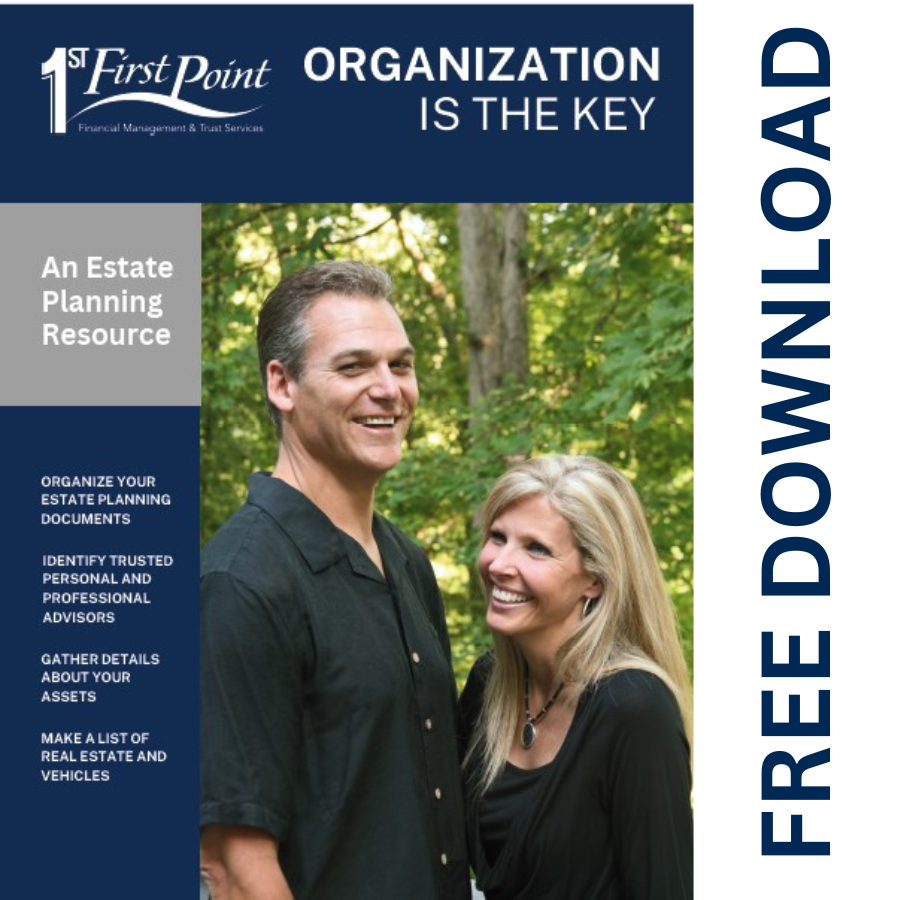Trust Services & Estate Administration
Section Menu

Be Confident Your Estate is in Skilled, Objective Hands
Trust Services
A trust is a legal arrangement that allows a third party, or trustee, such as First National Bank, to hold assets on behalf of a beneficiary or beneficiaries. Your trustee is a fiduciary who has a legal duty to act in your best interest.
Trusts can be written in many ways and can specify exactly how and when the assets pass to beneficiaries. Assets in a trust may also be able to pass outside of probate, saving time, court fees, and potentially reducing estate taxes as well. Other benefits of trusts include:
- Control of your wealth. You can specify the terms of a trust, controlling when and to whom distributions may be made.
- Protection of your legacy. A properly constructed trust can help protect your estate from creditors or from beneficiaries who may not be adept at money management.
- Privacy. While Probate is a matter of public record, a Trust allows assets to pass outside of Probate and remains private.
First National Bank Can Serve in Any of the Following Fiduciary Capacities
Executor, Co-Executor of an Estate. A Last Will and Testament is the legal document that dictates what happens to everything you own specifically in your name upon death. The appointed Executor oversees the administration and eventual distribution of assets and personal property as directed by the terms of your Will. Naming First National Bank as an impartial third-party Executor can help alleviate family conflicts that may occur due to decisions that must be made during the estate administration process.
 Trustee, Co-Trustee, or Successor Trustee of a Trust. A well-written Trust (Revocable, Irrevocable or Testamentary by Will) can reduce estate taxes and fees by avoiding probate, facilitate distribution of assets to whomever you decide, protect assets from creditors or even family members themselves, and remain private from public record. The Trustee is responsible for carrying out the written terms of the Trust document regarding investment and protection of the Trust's assets, filing taxes on behalf of the Trust, periodic accounting, and making income and principal distributions.
Trustee, Co-Trustee, or Successor Trustee of a Trust. A well-written Trust (Revocable, Irrevocable or Testamentary by Will) can reduce estate taxes and fees by avoiding probate, facilitate distribution of assets to whomever you decide, protect assets from creditors or even family members themselves, and remain private from public record. The Trustee is responsible for carrying out the written terms of the Trust document regarding investment and protection of the Trust's assets, filing taxes on behalf of the Trust, periodic accounting, and making income and principal distributions.
Two common circumstances that affect estate planning are concerns about individuals with special needs and blended families. Special Needs Trusts can be established for beneficiaries who are disabled and are structured in a way that allows them to continue to qualify for public assistance programs, such as Social Security Disability Insurance and Medicaid. Other special planning techniques with Trusts can accommodate blended families, with current and former spouses.
When acting as your fiduciary, First National Bank will be impartial and independent in dealings with all beneficiaries and will ensure your assets are handled with expertise, according to the legal terms of the documents.
Conservator. Financial Management & Trust Services can be appointed by a court to legally act as a conservator. There are many reasons why someone may need a conservator. Those reasons include someone who has become incapacitated, meaning they are no longer able to make decisions on their own.
There are many different types of conservatorships. Under a financial conservatorship, it would be Trust's responsibility to ensure that the conservatee's bills are paid, taxes are filed, and their day-to-day finances are taken care of, such as having enough money for spending. A physical conservatorship means Trust would make decisions for the conservatee regarding matters such as health care and where they live. A general conservatorship, the most comprehensive type of conservatorship, means Trust would be responsible for the conservatee's finances, health, and other significant decisions.
A conservator has a legal obligation to make decisions on behalf of the conservatee that are in their best interest.
Trustee of a Charitable Trust. A charitable trust holds assets and distributes them to charities. When the trust is established, you can specify how its assets will be invested and managed, as well as how it will make donations will be made. There are some tax benefits to setting up a charitable trust; speak to your tax advisor for details. Our Trust team can help you incorporate charitable giving into your estate plan and administer your trust to achieve your charitable giving goals.
Estate & Trust Administration Upon Death
Even the most well-thought-out estate plans can be complicated to execute. If First National Bank is appointed as a Trustee or Executor of an estate, our team will handle all of the decedent's affairs, including:
- Gathering, cataloging, valuing, and managing the estate's assets.
- Paying debts and expenses.
- Arranging for the preparation of final tax returns.
- Preparing for any continuation of trust funding.
- Making final disbursement to designated beneficiaries.
Our commitment to integrity ensures that we handle each case with the utmost care and respect for your privacy and wishes.
Estate Planning & Establishing a Trust
Act Now to Start the Estate Planning Process
No one can predict the future. Leaving unanswered questions about how to settle your affairs after you are gone can be costly and time-consuming for those carrying out your wishes. Putting all your important answers into an estate plan with the right legal documents, leaves no doubt about your intentions and can make all the difference. Planning ahead will give you greater control, privacy, and security of your legacy. Consult with an attorney to assist with your estate planning and in establishing a trust.
Important Milestones
Consider these important milestones in your planning process and be sure to make updates to your estate documents, as your life situations change.
- Once you turn 18. Who will make legal, health or financial decisions for you if you can’t?
- Marriage, starting a family or adoption. Who will inherit your assets, care for your children, and support your surviving spouse if something happens to you?
- The purchase of a home or other real estate. How should this asset be handled upon your death? By Will or Trust?
- Opening an investment account. Who will your beneficiaries be and are they old enough to inherit? Do you need a Will, Trust, or other beneficiary designation?
- Birth of a grandchild. Does your old estate plan include your newest family members?
- Inheritance of assets or a new job that increases your wealth. What should you do with it?
- Divorce. Have you updated your estate plan and beneficiary designations?
- Retiring. How will you transition from accumulating wealth to tapping into those assets? Do you have enough?
- Senior living. Where do you want to live if you need assisted living or long-term care? How will you downsize? Who will pay your bills, manage your finances, or make health decisions on your behalf, if you are unable or unwilling?
- In your 70s and beyond. Who takes care of your surviving spouse upon your death? Is your estate plan ready to be executed when necessary?
- Desire to donate to charity(ies). How can you give the most efficiently to those you care about the most?
FREE ORGANIZER
Organization is the Key is a free, online organizer compliments of First National Bank that you can print and complete at home; or fill out the document online and store an electronic copy for your records so that you can make updates in the future, if necessary. You can also request a printed copy of the booklet by contacting us by phone or using the form below.

|
Organization is the Key
When it comes to estate planning, organizing your estate documents is crucial for several reasons:
- Ease for loved ones. It ensures that your family and executors can easily find and access important information when needed, reducing stress during difficult times.
- Preparedness. Life is unpredictable, and having your documents in order means you're prepared for any situation.
- Efficiency. Proper organization can save time and money for those handling your estate.
- Updates and changes. Keeping your documents organized makes it easier to update them as your circumstances or wishes change.
- Legal and financial clarity. It helps ensure that your wishes are clearly understood and followed, minimizing misunderstandings.
|
Contact Us
If you are interested in speaking with a wealth advisor about trust services and estate administration, call us at 515-663.3037 or use the Contact Us form.
Contact Us